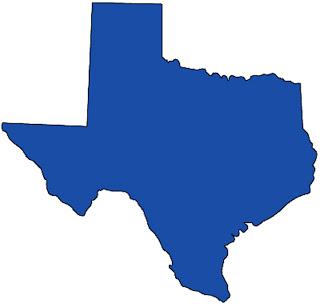 It's been a long time since Texas was a blue state. When President Johnson, with the support of the Democratic Party (and some Northern Republicans), passed a series of civil rights laws in the middle to late sixties, millions of racist Democrats left the party and joined the Republican Party. Since that time, the Republican Party has been the dominant party in Texas.
It's been a long time since Texas was a blue state. When President Johnson, with the support of the Democratic Party (and some Northern Republicans), passed a series of civil rights laws in the middle to late sixties, millions of racist Democrats left the party and joined the Republican Party. Since that time, the Republican Party has been the dominant party in Texas.How bad is it? Well, both houses of the state legislature have a large majority of Republicans, and there hasn't been a Democrat elected to any statewide office in more than 20 years. The last Democratic governor was Ann Richards, who was elected in 1990 (22 years ago). And while President Obama won a resounding victory last November, he lost to Willard Mitt Romney by 16 points in Texas. Texas isn't just a red state -- it's a bright red state.
There are some who believe (including me) that the demographic shift happening in the state favors the Democratic Party. With each passing year, there are more minority residents (especially Hispanics) and less Whites. The school system already has a statewide majority of minority students. But if that's all the Democrats are counting on, then they're going to have a long wait. It will be at least 25 years before the demographic shift really starts to help Democrats (and that's with a good organizing effort). Without a statewide organizing effort, it could take twice that long.
Our former state Democratic leadership did try to do some organizing, but it was ineffective because they only did it in the urban areas (where most current Democratic voters live). There was no effort to reach out to the deeply red areas of East Texas, West Texas, and the Panhandle. Our new leadership, elected in last summer's convention, is making a concerted effort to register Hispanic voters -- but the effort seems to be primarily aimed at South Texas. So far, I have seen very little evidence that they are interested in making a statewide effort.
I know that many activists are not interested in the rural areas of Texas because of the rather sparse population in many rural counties. But what they fail to realize is that Texas is a very large state with 254 counties, and most of those counties are rural. The Republicans have built their juggernaut by combining the rural vote and the suburban vote -- and combined, those two segments can outvote the urban areas statewide. Until the Democrats wake up and start to make significant inroads into the rural vote, they will never be a statewide threat to the Republicans.
And the crazy thing is that there are many rural counties that are ripe to be flipped. In the 26 county Panhandle, there are 12 counties that have a Hispanic majority -- with many more that will assume that same identity in the coming years. And the same thing is true of West Texas. A decent organizing effort could put a real dent in the Republican vote in the Panhandle and West Texas -- and that would help statewide Democratic candidates and hurt statewide Republican candidates.
The Democratic Party must stop ceding these areas to the Republicans, because that just gives Republicans a head start in statewide elections (and then all they have to do is match the Democratic urban vote with their own suburban vote, and they win big). The Democrats cannot be a dominant statewide party without a statewide strategy to go after every vote -- even rural votes.
The national Democratic Party has announced an effort to turn Texas blue -- or at least make it a swing state. They are creating an organization called "Battleground Texas", and say they will be pumping tens of millions of dollars into the state in registration efforts and support for candidates. Jeremy Bird, former national field director for the Obama campaign, will direct the organization. He says:
“With its diversity and size, Texas should always be a battleground state where local elections are vigorously contested and anyone who wants to be our commander in chief has to compete and show they reflect Texas values. Yet for far too long, the state’s political leaders, both in Austin and in Washington, D.C., have failed to stand for Texans. Over the next several years, Battleground Texas will focus on expanding the electorate by registering more voters — and as importantly, by mobilizing Texans who are already registered voters but who have not been engaged in the democratic process.”
I like the idea that the national party may not be willing to write-off Texas anymore, and I hope they can be effective. But I am going to reserve judgment until I see what they really have in mind. Are they going to reach out to ALL Texans in all parts of the state, or are they just going to put some money and effort into the same old urban/South Texas plan. If it is the latter, then they will fail. If it is the former, then it could be what Texas Democrats have been hoping for. We'll see in the next couple of years.

